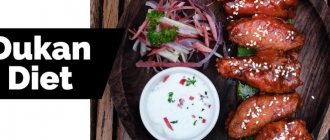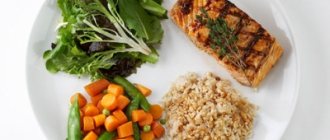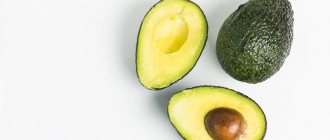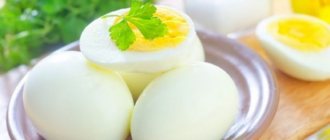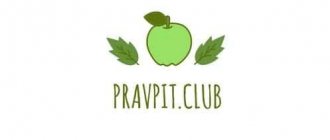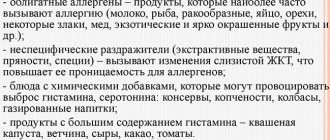General rules
During pregnancy , a woman’s body (all organs and systems) experiences increased stress, which is due to the need to create the necessary conditions for the development of the fetus.
And the most significant external factor for the normal course of pregnancy is properly organized nutrition. Unfortunately, most women in the post-Soviet space during pregnancy are characterized by a carbohydrate diet with a high content of saturated fatty acids and insufficient amounts of animal proteins in the diet. Such an irrational nutritional system with abuse of potatoes, bakery and pasta products affects the health of pregnant women and, accordingly, the fetus. And against the background of frequent overeating, it contributes to pathological weight gain and the development of pregnancy complications. Despite significant educational work in medical institutions/courses of preparation for pregnancy, information about the principles of healthy eating, the conservatism of women's eating habits/eating behavior during pregnancy still remains quite high.
Protein during pregnancy is the most important component of a woman’s diet, since this food nutrient containing amino acids is the main “building material” for the formation of tissues/organs of the fetus, without which the normal course of any vital physiological processes is impossible. A deficiency of the protein component in a pregnant woman’s diet creates a risk of developing pregnancy complications (miscarriage, uterine hypertonicity, oligohydramnios) and disruption of the formation of fetal organs and its vital functions.
Recommended protein intake values for pregnant women are calculated individually, taking into account body weight and gestational age. So for pregnant women of short stature (150 cm) / with a body weight of 50 kg, the need for protein in the first half of pregnancy is 90-100 g / in the second half - 105-110 g per day; average height (155-165 cm) / body weight 55-60 kg - in the first half of pregnancy 100-105 g / in the second - 110-120 g per day; tall (170-175 cm) and weighing more than 60 kg, the diet in the first half of pregnancy should include 120-125 g of protein / second - up to 130-135 g per day.
However, a protein diet for pregnant women provides not only the quantitative norms of protein in the diet, but also its quality. First of all, the most complete in terms of amino acid composition and the most easily digestible are proteins of animal origin, the sources of which are meat (veal, beef, rabbit, chicken, turkey), fish (cod, tuna, mackerel, flounder, trout, sardines, salmon) and seafood (shrimp), chicken egg white, cottage cheese, milk, cheese, fermented milk products (natural yogurt, fermented baked milk, kefir).
Plant proteins should also be present in the diet, the main sources of which are soybeans, legumes (chickpeas, beans, peas), nuts (pine, walnuts, hazelnuts, cashews, peanuts, almonds), seeds (sunflower, pumpkin).
The ratio of animal and plant proteins should be at least 60 to 40 percent. At the same time, the structure of animal proteins is formed by meat/fish 30% (150-250 g), dairy products 25% (500-600 g), eggs - 5% (3-4 pieces/week). It should be emphasized that meat/fish should be of minimal fat content (dietary), so preference should be given to chicken (home-grown only), turkey, rabbit and beef (veal). The consumption of meat products (sausages, smoked meats) should be kept to a minimum, and fast food should be completely eliminated.
As for the distribution of proteins during the day, it is recommended to consume protein foods mainly in the first half of the day. At the same time, in the first half, a protein-vegetable diet is recommended, i.e. you need to eat proteins with vegetables. Products containing animal protein are best steamed or boiled, since the protein in this form is most digestible and is the most valuable.
As for the content of other macronutrients in the diet, the fat content should be 75-80 g per day. At the same time, in the structure of fats, at least 40% should be vegetable fats, which contain PUFAs and vitamin E , necessary for the normal course of pregnancy.
As such products, it is recommended to use cold-pressed vegetable oils and products containing omega-3 (red fish, fish oil). Of animal fats, preference should be given to milk fats (butter, cream) and avoid saturated fats (solid animal fats - fatty meat, pork, lamb and beef fat).
The need for carbohydrates in the diet is satisfied by foods containing large amounts of plant fiber - wholemeal bread, grain bread, fiber, cereals, vegetables, fruits. The average carbohydrate content in the diet should correspond to the norm (400-450 g/day).
Starting from the second half of pregnancy, the amount of carbohydrates is reduced to 300-350 g/day by limiting the consumption of sugar, confectionery, sweets, and jam, as they contribute to pathological weight gain. The amount of sugar is limited to 40 g per day.
The main factor in controlling diet is the dynamics of body weight, the increase of which in the 2nd half of pregnancy should not exceed 250-400 g/week. Exceeding this indicator indicates excess nutrition or the presence of edema. Correction of the calorie content of the daily diet in the direction of reduction must be carried out even when the pregnant woman is on bed rest, since the need for energy in this state is reduced by 20-30%.
Correction of the diet and the introduction of fasting days are also necessary if a pregnant woman is overweight, but this must be done under the supervision of a doctor, the condition of the pregnant woman, and fetal development indicators.
Foods to Avoid
During pregnancy the following are contraindicated:
- Shark meat, swordfish and marlin, or eat them in minimal quantities due to possible mercury content.
- Raw or partially cooked meat.
- Raw shellfish (there is a risk of bacterial or viral contamination that can cause food poisoning; some bacteria and viruses can also cross the placenta and cause harm to the fetus).
- Raw eggs, including any foods with raw or partially cooked eggs in them. Eggs must be well cooked to avoid salmonella contamination.
- Pate (vegetable or meat).
- A soft, ripened cheese such as blue-veined, brie or camembert.
- High-calorie foods (cakes, cookies, chips and candies) should be kept to a minimum. Many of these options are high in sugar and fat, have low nutritional content and can contribute to excess weight gain.
All foods must be cooked or else there is a risk of contamination with listeria (bacteria that can cause potentially fatal infections in pregnant women and their children).
Authorized Products
The protein diet for pregnant women with a body weight corresponding to the duration of pregnancy should contain:
- Weak/low-fat meat/fish and vegetable broths and soups based on them with the addition of cereals and vegetables.
- Dietary varieties of red meat (veal/beef), rabbit meat, poultry (turkey, chicken), which are recommended to be steamed, baked or boiled in the form of cutlets, rolls, zraz, meatballs or in pieces.
- Low-fat fish (cod, tuna, pike perch, mackerel, flounder, trout, sardines, salmon) and seafood.
- Cold-pressed vegetable oils (olive, corn, flaxseed, sunflower).
- Animal fats include butter.
- Rye bread, wholemeal bread, bran bread, savory cookies.
- Dairy/fermented milk products (milk, cream, cottage cheese, cheese, natural yogurt, kefir, fermented baked milk).
- Chicken eggs (2-3 per week) in the form of steamed omelettes/cooked soft-boiled.
- Vegetables/fruits (zucchini, tomatoes, different varieties of cabbage, bell peppers, carrots, cucumbers, pumpkin) both raw and boiled/baked. Garden greens (lettuce, parsley, dill, green onions) are used as seasonings.
- Legumes (chickpeas, peas, soybeans, beans).
- Nuts (pine, walnuts, hazelnuts, cashews, peanuts, almonds), seeds (pumpkin/sunflower).
- Drinks include rosehip decoction, still mineral water, weak tea with milk, diluted pureed juices and unsweetened fruit and berry compotes.
Table of permitted products
| Proteins, g | Fats, g | Carbohydrates, g | Calories, kcal | |
Vegetables and greens | ||||
| vegetables legumes | 9,1 | 1,6 | 27,0 | 168 |
| eggplant | 1,2 | 0,1 | 4,5 | 24 |
| zucchini | 0,6 | 0,3 | 4,6 | 24 |
| broccoli | 3,0 | 0,4 | 5,2 | 28 |
| cabbage | 1,2 | 0,2 | 2,0 | 16 |
| cauliflower | 2,5 | 0,3 | 5,4 | 30 |
| boiled cauliflower | 1,8 | 0,3 | 4,0 | 29 |
| potato | 2,0 | 0,4 | 18,1 | 80 |
| watercress | 2,3 | 0,1 | 1,3 | 11 |
| carrot | 1,3 | 0,1 | 6,9 | 32 |
| cucumbers | 0,8 | 0,1 | 2,8 | 15 |
| salad pepper | 1,3 | 0,0 | 5,3 | 27 |
| radish | 1,2 | 0,1 | 3,4 | 19 |
| celery | 0,9 | 0,1 | 2,1 | 12 |
| tomatoes | 0,6 | 0,2 | 4,2 | 20 |
| pumpkin | 1,3 | 0,3 | 7,7 | 28 |
| dill | 2,5 | 0,5 | 6,3 | 38 |
Fruits | ||||
| apricots | 0,9 | 0,1 | 10,8 | 41 |
| watermelon | 0,6 | 0,1 | 5,8 | 25 |
| melon | 0,6 | 0,3 | 7,4 | 33 |
| nectarine | 0,9 | 0,2 | 11,8 | 48 |
| peaches | 0,9 | 0,1 | 11,3 | 46 |
| apples | 0,4 | 0,4 | 9,8 | 47 |
Berries | ||||
| strawberry | 0,8 | 0,4 | 7,5 | 41 |
| raspberries | 0,8 | 0,5 | 8,3 | 46 |
Nuts and dried fruits | ||||
| nuts | 15,0 | 40,0 | 20,0 | 500 |
Cereals and porridges | ||||
| buckwheat (kernel) | 12,6 | 3,3 | 62,1 | 313 |
| cereals | 11,9 | 7,2 | 69,3 | 366 |
| pearl barley | 9,3 | 1,1 | 73,7 | 320 |
| white rice | 6,7 | 0,7 | 78,9 | 344 |
| barley grits | 10,4 | 1,3 | 66,3 | 324 |
Bakery products | ||||
| white bread crackers | 11,2 | 1,4 | 72,2 | 331 |
Confectionery | ||||
| marshmallows | 0,8 | 0,0 | 78,5 | 304 |
| meringues | 2,6 | 20,8 | 60,5 | 440 |
| paste | 0,5 | 0,0 | 80,8 | 310 |
Raw materials and seasonings | ||||
| milk sauce | 2,0 | 7,1 | 5,2 | 84 |
Dairy | ||||
| milk | 3,2 | 3,6 | 4,8 | 64 |
| kefir 2% | 3,4 | 2,0 | 4,7 | 51 |
| cream 15% (low fat) | 2,3 | 15,0 | 3,6 | 161 |
| sour cream 15% (low fat) | 2,6 | 15,0 | 3,0 | 158 |
| curdled milk | 2,9 | 2,5 | 4,1 | 53 |
Cheeses and cottage cheese | ||||
| cottage cheese 1.8% (low-fat) | 18,0 | 1,8 | 3,3 | 101 |
Meat products | ||||
| boiled beef | 25,8 | 16,8 | 0,0 | 254 |
| beef liver | 17,4 | 3,1 | 0,0 | 98 |
| boiled beef tongue | 23,9 | 15,0 | 0,0 | 231 |
| boiled veal | 30,7 | 0,9 | 0,0 | 131 |
| rabbit | 21,0 | 8,0 | 0,0 | 156 |
Bird | ||||
| boiled chicken | 25,2 | 7,4 | 0,0 | 170 |
| turkey | 19,2 | 0,7 | 0,0 | 84 |
Eggs | ||||
| chicken eggs | 12,7 | 10,9 | 0,7 | 157 |
Fish and seafood | ||||
| salmon caviar granular | 32,0 | 15,0 | 0,0 | 263 |
| seaweed | 0,8 | 5,1 | 0,0 | 49 |
Oils and fats | ||||
| butter | 0,5 | 82,5 | 0,8 | 748 |
| linseed oil | 0,0 | 99,8 | 0,0 | 898 |
| olive oil | 0,0 | 99,8 | 0,0 | 898 |
| ghee | 0,2 | 99,0 | 0,0 | 892 |
Non-alcoholic drinks | ||||
| mineral water | 0,0 | 0,0 | 0,0 | — |
Juices and compotes | ||||
| apricot juice | 0,9 | 0,1 | 9,0 | 38 |
| carrot juice | 1,1 | 0,1 | 6,4 | 28 |
| pumpkin juice | 0,0 | 0,0 | 9,0 | 38 |
| rose hip juice | 0,1 | 0,0 | 17,6 | 70 |
| * data is per 100 g of product | ||||
Third trimester
- Iron-rich foods.
Iron is an excellent prevention of anemia. It provides the uterus with the necessary tone, promoting successful pregnancy. There is a lot of iron in white beans, beef liver, lentils, shellfish, cashews, dark chocolate and spinach.
- Foods rich in vitamin C.
Vitamin C supports the immune system, protects against viruses and is involved in the proper formation of the placenta and membrane of the fertilized egg. There is a lot of vitamin C in rose hips, sweet peppers, black currants, sea buckthorn, citrus fruits, kiwi and strawberries.
- Vitamin D Rich Foods
. Vitamin D will be a good prevention of rickets in a baby and will help form a healthy skeleton. There is a lot of vitamin D in sea bass, eggs, liver, butter and sour cream.
Now you know which foods you should be leaning on! And to receive other useful articles about pregnancy and baby development, as well as keep abreast of all promotions and special offers, register on our website.
Fully or partially limited products
The following are excluded from the protein diet for pregnant women:
- Products containing dyes, flavor enhancers and preservatives (processed cheese, curd mass).
- Fatty meat/fish broths, all fatty meats, animal fat, smoked meats, confectionery fats, sausages, dumplings, mayonnaise, margarine, fast food, semi-finished meat products.
- Fatty varieties of sea/river fish, crab sticks, salted fish, canned fish.
- Pastries, pastries, cakes, dough, condensed milk, chocolate, candies, ice cream, sugar.
- Fruits include grapes and bananas.
- Drinks include strong tea/coffee, sweet carbonated drinks, and alcohol.
Table of prohibited products
| Proteins, g | Fats, g | Carbohydrates, g | Calories, kcal | |
Vegetables and greens | ||||
| vegetables legumes | 9,1 | 1,6 | 27,0 | 168 |
| beet | 1,5 | 0,1 | 8,8 | 40 |
| horseradish | 3,2 | 0,4 | 10,5 | 56 |
Fruits | ||||
| bananas | 1,5 | 0,2 | 21,8 | 95 |
Berries | ||||
| grape | 0,6 | 0,2 | 16,8 | 65 |
Snacks | ||||
| potato chips | 5,5 | 30,0 | 53,0 | 520 |
Cereals and porridges | ||||
| semolina | 10,3 | 1,0 | 73,3 | 328 |
Flour and pasta | ||||
| pasta | 10,4 | 1,1 | 69,7 | 337 |
Confectionery | ||||
| jam | 0,3 | 0,2 | 63,0 | 263 |
| jelly | 2,7 | 0,0 | 17,9 | 79 |
| candies | 4,3 | 19,8 | 67,5 | 453 |
| cake | 3,8 | 22,6 | 47,0 | 397 |
| dough | 7,9 | 1,4 | 50,6 | 234 |
Ice cream | ||||
| ice cream | 3,7 | 6,9 | 22,1 | 189 |
Chocolate | ||||
| chocolate | 5,4 | 35,3 | 56,5 | 544 |
Raw materials and seasonings | ||||
| mustard | 5,7 | 6,4 | 22,0 | 162 |
| ketchup | 1,8 | 1,0 | 22,2 | 93 |
| mayonnaise | 2,4 | 67,0 | 3,9 | 627 |
| honey | 0,8 | 0,0 | 81,5 | 329 |
| ground black pepper | 10,4 | 3,3 | 38,7 | 251 |
| sugar | 0,0 | 0,0 | 99,7 | 398 |
Dairy | ||||
| condensed milk | 7,2 | 8,5 | 56,0 | 320 |
Cheeses and cottage cheese | ||||
| cottage cheese 18% (fat) | 14,0 | 18,0 | 2,8 | 232 |
Meat products | ||||
| fried pork | 11,4 | 49,3 | 0,0 | 489 |
| salo | 2,4 | 89,0 | 0,0 | 797 |
| raw smoked pork belly | 7,6 | 66,8 | — | 632 |
Sausages | ||||
| smoked sausage | 28,2 | 27,5 | 0,0 | 360 |
| dry-cured sausage | 24,1 | 38,3 | 1,0 | 455 |
| pork sausages | 11,8 | 30,8 | 0,0 | 324 |
Bird | ||||
| fried chicken | 26,0 | 12,0 | 0,0 | 210 |
| smoked chicken | 27,5 | 8,2 | 0,0 | 184 |
| duck | 16,5 | 61,2 | 0,0 | 346 |
| goose | 16,1 | 33,3 | 0,0 | 364 |
Fish and seafood | ||||
| dried fish | 17,5 | 4,6 | 0,0 | 139 |
| smoked fish | 26,8 | 9,9 | 0,0 | 196 |
| canned fish | 17,5 | 2,0 | 0,0 | 88 |
| semi-finished fish products | 12,5 | 6,7 | 14,7 | 209 |
Oils and fats | ||||
| creamy margarine | 0,5 | 82,0 | 0,0 | 745 |
| coconut oil | 0,0 | 99,9 | 0,0 | 899 |
| animal fat | 0,0 | 99,7 | 0,0 | 897 |
| cooking fat | 0,0 | 99,7 | 0,0 | 897 |
Alcoholic drinks | ||||
| white dessert wine 16% | 0,5 | 0,0 | 16,0 | 153 |
| cognac | 0,0 | 0,0 | 0,1 | 239 |
| beer | 0,3 | 0,0 | 4,6 | 42 |
Non-alcoholic drinks | ||||
| cola | 0,0 | 0,0 | 10,4 | 42 |
| coffee with milk and sugar | 0,7 | 1,0 | 11,2 | 58 |
| Pepsi | 0,0 | 0,0 | 8,7 | 38 |
| sprite | 0,1 | 0,0 | 7,0 | 29 |
| black tea with milk and sugar | 0,7 | 0,8 | 8,2 | 43 |
| energy drink | 0,0 | 0,0 | 11,3 | 45 |
Juices and compotes | ||||
| jelly | 0,2 | 0,0 | 16,7 | 68 |
| * data is per 100 g of product | ||||
List of protein foods for pregnant women
Since the protein diet is not considered a diet in the generally accepted sense, the list of products included in it is quite extensive. There are plenty to choose from. Proteins of animal origin are considered complete and are completely absorbed by the body.
This:
- Beef;
- Turkey and chicken fillet;
- Chicken and quail eggs (preferably homemade);
- Cottage cheese is grainy;
- Hard and curd cheese;
- Milk, whey (with caution);
- Cod fish;
- Salmon;
- Tuna;
- Shrimp, mussels, oysters (raw).
Proteins of plant origin do not contain all the amino acids necessary for health and are less digestible. However, they put less strain on the digestive tract and are still needed by the body.
This:
- Soy and its processed products (tofu, edamame);
- Lentils, peas, chickpeas, beans;
- Quinoa;
- Peanuts, almonds, pine nuts, cashews, hazelnuts;
- Spirulina;
- Chia;
- Potato;
- Beans;
- Broccoli and cauliflower;
- Spinach, parsley.
Prohibited foods during a protein diet
For the results of protein consumption to be noticeable, pregnant women will have to give up certain foods:
- Fast food;
- Semi-finished products (cutlets, hot dogs, sausage);
- Spicy dishes with lots of spices;
- Fried;
- Fatty sauces based on mayonnaise and butter;
- Canned food (meat, fish, salads, vegetables);
- Mushrooms in any form;
- Alcohol, black tea, coffee (you can drink green and white tea, cocoa);
- Bananas and grapes (they naturally have too much sugar);
- Sweet pastries, desserts, baked goods, pies.
Be sure to read: Maggi diet: menu for 4 weeks, cottage cheese recipes, benefits and harms
What foods can you eat?
It is a mistake to believe that there is no place for carbohydrates in a protein diet. Just the opposite. With a deficiency of the latter, complications are possible in the second and third trimester - shortness of breath, vomiting, dizziness.
Therefore, we wisely supplement protein with slow carbohydrates as a side dish:
- Oatmeal;
- Buckwheat;
- Brown and wild rice;
- Pasta from durum wheat;
- Bulgur;
- Whole wheat bread.
Fast carbohydrates are present in honey, natural juice, berries and fruits. Fatty foods are prohibited, but for the most part they are animal fats and heated vegetable oils.
It is not forbidden to season vegetable salads with directly pressed vegetable, olive, sesame or flaxseed unrefined oil.
It is better to create a diet so that during the day the expectant mother receives a varied protein diet: meat, fish, dairy products, a share of fiber, carbohydrates and fats. Exactly in this sequence.
Do not get carried away with legumes and soybeans, eat salmon (a fatty type of fish) and seafood (can cause allergies) with caution.
The following drinks are allowed: compotes, homemade fruit drinks, water with lemon.
The diet is based on 3 full meals and 1-2 snacks. In total, food should bring 1800-1900 kcal per day.
Protein diet menu during pregnancy (Diet)
It is recommended that the protein diet menu for pregnant women be drawn up taking into account the list of permitted/prohibited and partially restricted foods, taking into account the need to provide the pregnant woman with physiologically adequate nutrition and the required calorie content of the diet. It is extremely important to properly distribute food at each meal. Protein products increase the level of metabolism, excite the nervous system, and remain in the gastrointestinal tract for a long time.
Therefore, meat/fish and cereals should be consumed mainly in the first half of the day, and in the second half it is recommended to consume dairy and vegetable foods. You should control the amount of food for dinner, since eating a large meal at this time disrupts normal sleep and negatively affects the health of the pregnant woman. Food should be freshly prepared and not reheated several times, as its quality decreases sharply.
Liquid: how much to drink during pregnancy?
Do not limit yourself in the amount of liquid; drinking up to 3 liters per day is the norm. One of the main rules: a pregnant woman should not feel thirsty, but she must choose the right drinks. Sweet drinks: compotes, canned juices, nectars, soda - retain fluid in the body, it is better to exclude them from the diet. Switch to clean, filtered water or from a reliable source. Attention! Edema during pregnancy must be combated not by reducing the amount of fluid, but by rational nutrition and monitoring the condition of the kidneys. Neither water nor salt can be excluded! Remember: for the baby’s health, the mother’s blood volume must increase one and a half times: this is provided by water, salt and proteins.
Of course, you should eat at least three times a day, and preferably more often and in small portions. Avoid products that are as far from nature as possible: snacks, canned food, fast food, sweets, all products with a long shelf life. Do not eat semi-finished and ready-made baked goods, sauces and mayonnaise - they contain trans-isomers of fatty acids, which interfere with the absorption of healthy fats. For the same reason, do not cook with margarine. Here are three simple rules to determine what you shouldn't eat.
- Something that did not exist before the beginning of the 20th century.
- Something that lasts a long time and is packaged in plastic.
- Something that requires a lot of advertising to get people to buy it.
All this, as a rule, is not food.
Reviews and results
As a rule, a protein diet for pregnant women allows you to provide the woman’s body and fetus with all the necessary macro/micronutrients, thereby reducing the potential risk of pregnancy complications and fetal development disorders.
- “... Pregnancy 26 weeks. Yesterday I had a routine check-up with the doctor. I was upset by the insufficient weight gain, although I feel normal. They advised me to change my diet by increasing the amount of protein. Therefore, you will have to lean more on meat, fish, and cottage cheese. I hope to meet the standard by the next inspection.”
Key recommendations for subsidies of vitamins and microelements:
- Folic acid . To prevent the development of defects of the nervous and other systems. All women 3 months before pregnancy and the first 3 months of pregnancy at a dose of 400-800 mcg/day.
- Iodine . For married couples living in iodine-deficient areas (95% of the territory of Russia). To prevent idiopathic cretinism and congenital diseases of the thyroid gland in a child, additional iodine intake is necessary 3 months before pregnancy at a dose of 200 mcg/day, during pregnancy - 200-250 mcg/day.
- Iron . All women before and during pregnancy need iron supplementation at a dose of 60 mg/day (this dose is included in many IUDs). If anemia is present, the dose is increased as prescribed by the doctor.
- Vitamin D. It is advisable for women preparing to conceive to take vitamin D at a dose of 1000 IU/day. The decision on additional intake must be made based on determining its concentration in the blood.
- Polyunsaturated fatty acids (PUFAs). In preparation for pregnancy, it is advisable for all women to take PUFAs at a dose of 300 mg/day, followed by administration throughout pregnancy to prevent pregnancy complications and the physiological formation of the structures of the brain, visual organs and immune system of the fetus.
- Multivitamin mineral complexes . The feasibility of subsidizing vitamins and microelements in preparation for pregnancy and during pregnancy has been proven. But the decision to prescribe a specific drug is made by the doctor based on the available evidence base and confirmation of the high quality of the drug’s production.
What foods can you eat?
After you have dealt with the prohibitions and rid the refrigerator of junk food, you want to know what can you cook? Products recommended for a protein diet include:
- Lean fish. It can be stewed, boiled, baked.
- Livestock and poultry meat.
- It is allowed to consume a variety of seafood in reasonable quantities.
- Milk and all products prepared with its participation.
- Cereals.
- Vegetables and fruits are recommended to be consumed fresh.
- Nuts.
- Compotes, freshly squeezed juices, green tea.
At first glance, this diet seems quite meager and monotonous, but in fact, from the above products you can prepare not just healthy, but also tasty dishes. It is possible that in a moment of weakness you will want to eat something harmful and high-calorie, but it is better to restrain yourself as much as possible.
Example of a balanced menu
Of course, it is better if the diet is compiled individually, taking into account possible contraindications and allergies, but you can familiarize yourself with what the ideal menu should look like:
- Breakfasts should be high in calories and provide the body with energy for the whole day. The well-being and mood of a pregnant woman depends on the first meal. This could be buckwheat porridge, omelette with cheese and baked apples.
- During a snack, it is recommended to eat cottage cheese, yogurt or fruit salads.
- Lunch must include a first course, meat and a side dish (porridge, potatoes, stewed vegetables).
- If after a few hours the stomach requires additional food, then it is acceptable to drink milk or eat a small handful of shrimp.
- For dinner, boiled chicken with vegetables and a glass of fresh juice are suitable.
This menu contains all the necessary elements for the normal functioning of the body and the proper development of the fetus. Moreover, the figure will remain in good condition.
Pros and benefits of a protein diet for pregnant women
It is difficult to underestimate the benefits and advantages of such nutrition during pregnancy:
- The food will be varied and healthy;
- The body receives building material for the growth of new cells for both mother and child;
- The weight will remain the same, and the body will recover more quickly after childbirth;
- The swelling will go away;
- A cheerful mood and an optimistic outlook on life will become your constant companions;
- Prevention of anemia and strengthening the immune system.
Protein diet for pregnant women: menu for the week
Ideally, a doctor or nutritionist should draw up a nutrition plan, but if it is not possible to consult a specialist, then when selecting foods and dishes, you need to be guided by the principles of a healthy lifestyle.
| Breakfast | Late breakfast | Dinner | Afternoon snack | Dinner | |
| 1 day | Apple juice, oatmeal, bread | Dried fruits | Spaghetti with seafood, chicken soup, fruit drink | A glass of kefir | Cottage cheese casserole, any seasonal fruit, tea |
| Day 2 | Green tea, bread and butter, vegetable salad | A handful of nuts | Fish soup, beef stew with rice, rosehip broth | Drinking yoghurt | Cereal porridge, fruit drink |
| Day 3 | Omelet with tomatoes and herbs, white tea | Orange | Boiled breast, buckwheat, cucumber, compote | Cottage cheese with berries | Steamed broccoli with stewed beef, green tea |
| 4 day | Wheat porridge with milk, cheese, compote | Grapes quiche-mish 10 berries | Cod fillet, boiled potatoes, sweet pepper, pear uzvar | Ryazhenka | Boiled chicken thigh with rice, a glass of kefir |
| 5 day | Poached egg, apple, glass of kefir | Dried fruits | Steamed chopped poultry cutlets, green beans, fruit drink | A glass of kefir | Baked fish, steamed asparagus, bran bread, compote |
| Day 6 | Buckwheat with milk, half a pear, tea | Piece of cheese with bread | Pasta with minced meat, chicken broth, lettuce, freshly squeezed orange juice | Banana and fruit drink | Stewed cauliflower, boiled egg, half an apple, tea |
| Day 7 | Vegetable salad, mozzarella 30g, bread, compote | A handful of nuts | Salmon baked in foil with rice, fresh vegetables, white tea | Snowball half a glass | Turkey breast with vegetables and spaghetti, water with lemon |
Be sure to read: Herbalife recipes at home: the essence of the diet, products, how to take, menu for the week
Protein diet for pregnant women: contraindications
But don’t rush to go on a protein diet when you see 2 stripes.
There is a group of expectant mothers who should avoid it:
- For those who have problems with the gastrointestinal tract;
- Who has disturbances in the functioning of the heart, surges in blood pressure;
- With a lack of carbohydrates. Usually, this affects the functioning of the kidneys and liver.
- The pregnant woman's weight is more than 5 kg below normal.
If you are prone to allergies, you should first take a test for allergens - nuts, seafood, lactose. And partially adjust the protein diet based on the results.
Thousands of mothers are committed to a protein diet. After all, this is a great way to stay in shape and feel cheerful and fresh even while expecting a baby, when the body works for two.

